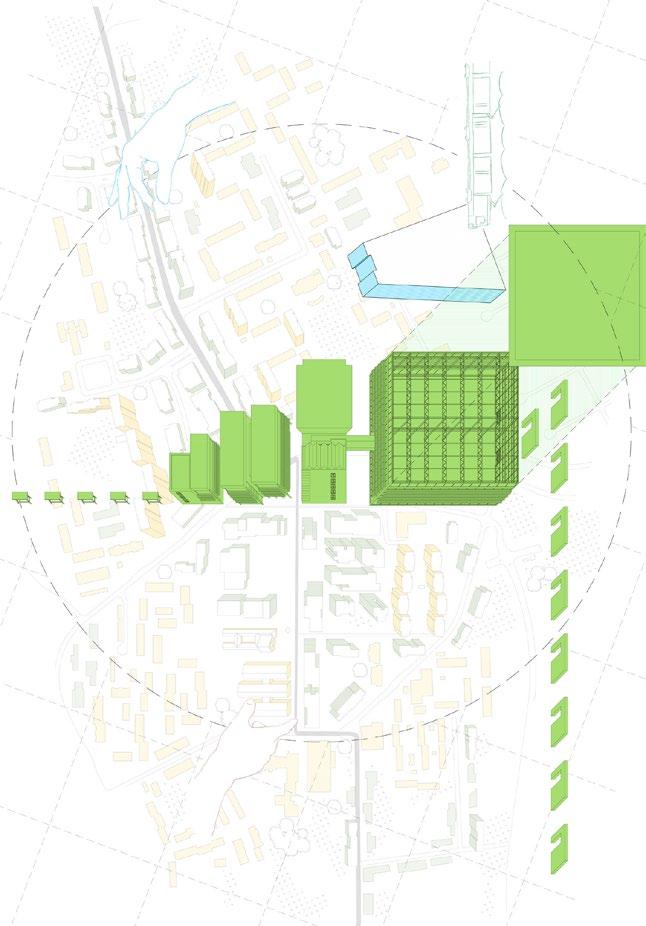
3 minute read
The Ethical City and the Final Design Thesis
The Ethical City
The Ethical City is on ongoing body of research conducted by the Stage 5 students and staff of the final diploma year at the Mackintosh School of Architecture in Glasgow. A different European city is studied each academic year in order to establish patterns and connections between these cities and Glasgow. in The fundamental aim is to learn from one another how we as architects and urbanists might circumnavigate the obstacles to sustainable regenerative urban repair, and to collate a tool box of powerful methodology to achieve long term positive urban change.
Reflecting upon Glasgow in Stage 4 while discovering and absorbing a new city in Stage 5 at once invites comparison and contrast between cities, such as their geographic situations, topographies and climates as well as the potent political, economic, social and cultural aspects which shape their particular morphologies and character. As in any city, the relative constancy or shifting dynamics of these influential forces have informed a continuous process of urban repair, renewal, and sometimes reinvention. Finding meaningful architectural expression which harnesses anticipated change is one of the most creative challenges of any urban architecture, one which is truly relevant to place, purpose and people.
With the ongoing threat of pandemics, artificial intelligence, food and energy insecurity, the climate emergency, and political upheaval across the globe (manifest in direct action, strikes and outright rebellion from ordinarily placid populations), we are asking the question, what is the future of our cities? How can we mend the urban scars, how can we as architects support people in their daily struggles, and mitigate and send into reverse climate change? The choices that we make as urbanists and architects can no longer be separated from our ethical positions.
The Final Design Thesis reveals a set of ethical questions, observations, issues and architectural responses. Each body of work evidences the gathering, organisation, analysis, synthesis and deployment of data, research and theory, thus generating an original intellectual position, and a creative, responsive architectural proposal.
Stage 5
Stage 5 is designed to capitalise on the skills and knowledge accumulated by students in the previous five years of education and professional experience. It is a teaching program with increasing levels of self-directed and peer learning, culminating in a Final Design Thesis and Architectural Technology proposal.
The Final Design Thesis/Architectural Technology proposal is comprehensively investigated and resolved to a level sufficient to serve as evidence of its architectural validity. It requires that students demonstrate an ability to develop a personal line of inquiry, professional level of judgement, solve complex problems and address issues relevant to contemporary architectural discourse. It aims to consolidate a student’s architectural thought, allowing them to define for themselves what kind of architect they want to be and what kind of architecture they want to pursue in their career.
Students are expected to operate with professionalism, independence and self-direction in preparation for the start of their architectural career.
The Final Design Thesis (FDT)
The Final Design Thesis is one of two major components to the Stage 5 year, (the other being Architectural Technology). It requires that students formulate and support intellectual positions with arguments that can be evidenced in an architectural proposal. This demands that students make strong visual, verbal and written arguments in support of their architectural intentions.
The thesis work uses the year theme of ‘The Ethical City’. The intention is to engage the student in debates around the role of architects and architecture in addressing concerns facing the city, such as sustainability, social cohesion and community resources, and how the city facilitates and nurtures society.
In 2022-23 the Stage 5 cohort worked in Brussels, using the specific urban, political, economic, social and cultural issues that occur there, to develop an ethical standpoint as the basis for the thesis investigation.
The FDT demands that risks are taken, processes are explored, unique artefacts are produced and the conversation around architecture expanded. It is not judged solely as a piece of architecture, but as a body of work, whose value is in the depth of investigation, the strength of the arguments, the judgement displayed, the intellectual context demonstrated, and the relationship of the architectural proposal to these things. Students are required to demonstrate their own personal and original intellectual exploration in their work.
Architectural Technology (AT)
The other major component of the Stage 5 year is Architectural Technology. This component of Stage 5 again builds on the architectural technology inputs from Stage 4.
While the FDT and AT are two separate courses, they are conceived as an integrated whole and consequently the thesis work is required to address both courses explicitly at all times. Students are required to develop architectural forms driven by and integrated with technical concepts.
9
10 Jette Jette 5 10387










